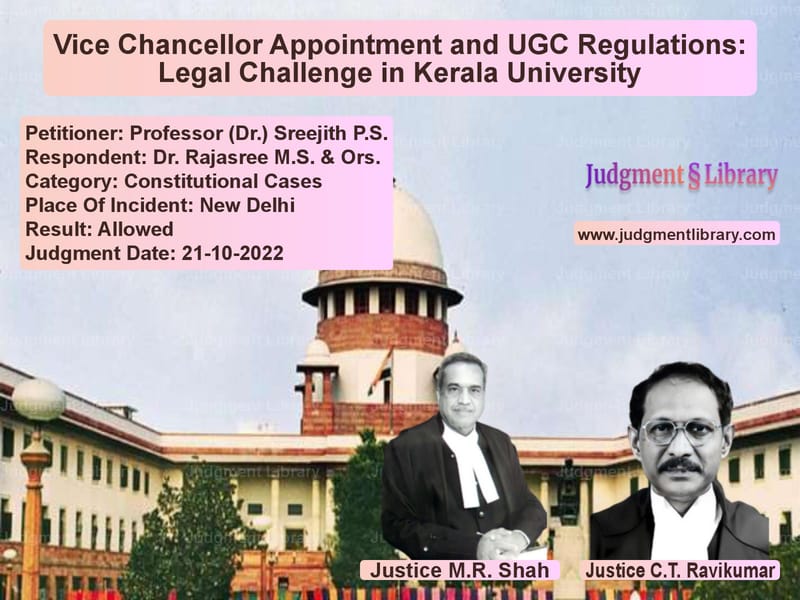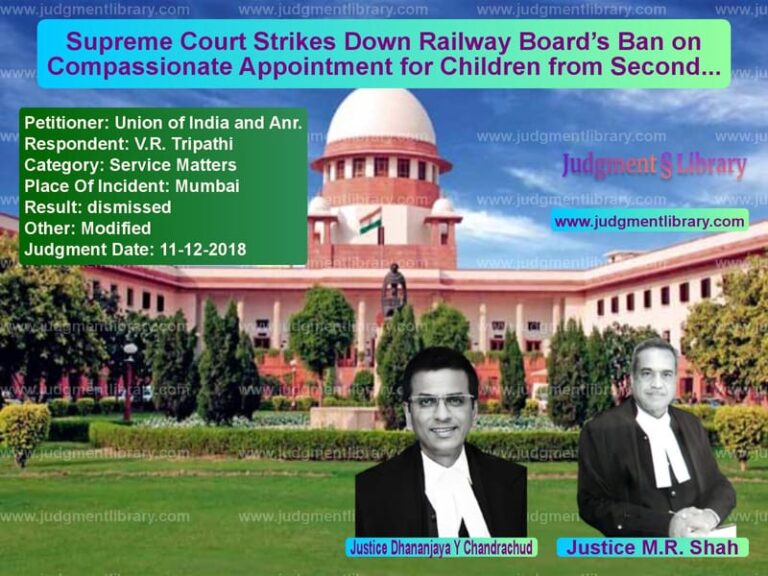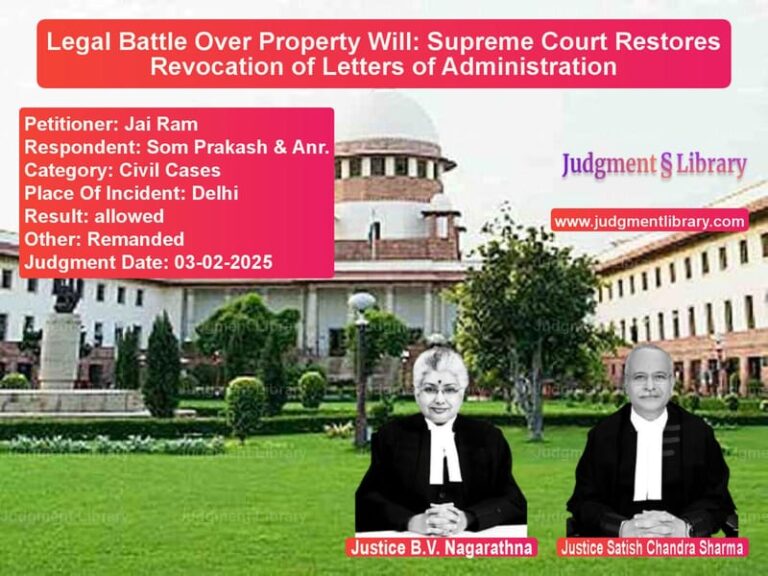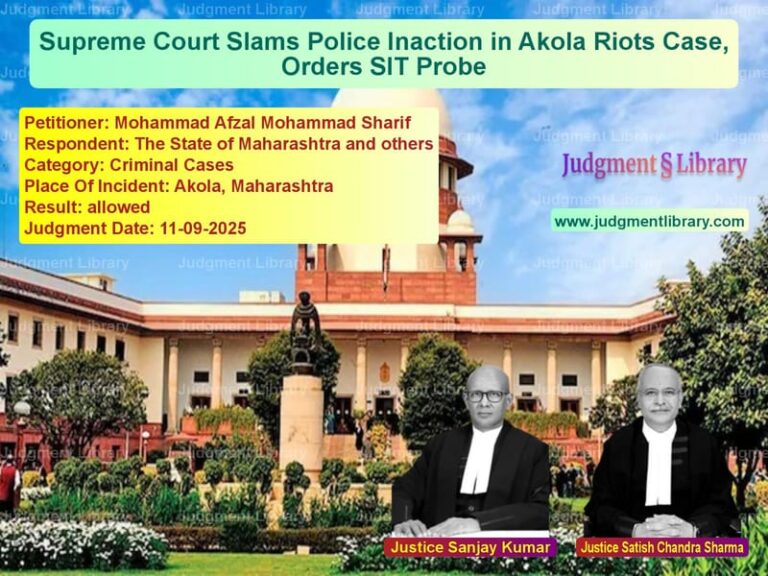Vice Chancellor Appointment and UGC Regulations: Legal Challenge in Kerala University
This case involves a challenge to the appointment of Dr. Rajasree M.S. as Vice Chancellor (VC) of the APJ Abdul Kalam Technological University, Thiruvananthapuram. The appellant, Professor (Dr.) Sreejith P.S., contested the appointment, arguing that it violated the provisions of the University Grants Commission (UGC) Regulations and the University Act. The appellant’s primary contention was that the Search Committee for the appointment did not follow the UGC guidelines, as it failed to recommend a panel of three to five candidates, as stipulated by the UGC Regulations. This case brings to light the issue of whether UGC Regulations or State University Acts should prevail when it comes to appointing Vice Chancellors in State universities.
Background:
The appellant filed a writ petition before the High Court of Kerala, seeking a writ of quo warranto to declare the appointment of Dr. Rajasree M.S. as VC void. The appellant argued that the appointment was made without following the proper procedures outlined in the UGC Regulations and the University Act, 2015. Specifically, the Search Committee constituted for the appointment of the VC recommended only one name, whereas the UGC Regulations required a panel of three to five names to be recommended. The appellant also contended that the UGC Regulations, 2010, were adopted by the State Government in 2010, and any subsequent amendments to the UGC Regulations must be applied to the university appointments in Kerala.
The High Court dismissed the appellant’s petition, stating that the State University Act prevailed over the UGC Regulations, as the UGC Regulations had not been specifically adopted by the State Government in the relevant amendments. The appellant appealed to the Supreme Court, arguing that the UGC Regulations should prevail and that the appointment was made contrary to the provisions of the Regulations.
Appellant’s Arguments:
The appellant’s counsel, Shri Amith George, argued that the appointment of Dr. Rajasree M.S. as Vice Chancellor was invalid because the Search Committee failed to recommend a panel of three to five names, which is a requirement under the UGC Regulations. He cited previous Supreme Court decisions, including Gambhirdan K. Gadhvi v. State of Gujarat and State of West Bengal v. Anindya Sundar Das, which held that the UGC Regulations should prevail over any conflicting State legislation. The appellant contended that the appointment was made in violation of the UGC Regulations, which mandate a fair and transparent process for selecting the VC.
The appellant further argued that the UGC Regulations were adopted by the State Government in 2010, and although the subsequent amendments were not specifically adopted, the UGC Regulations should still apply. He emphasized that the role of the VC is crucial to the governance of the university, and any appointment that does not comply with the established guidelines would undermine the integrity of the university system.
Respondent’s Arguments:
The respondents, representing Dr. Rajasree M.S. and the State Government, argued that the UGC Regulations were not mandatory and that the provisions of the University Act, 2015, which governed the appointment of Vice Chancellors, prevailed in the state of Kerala. The respondents contended that the UGC Regulations, though advisory in nature, did not override the provisions of the State Act, and therefore, the appointment of the VC was in accordance with the University Act. They also argued that the Search Committee was appropriately constituted under the State Act and that it had the authority to recommend the appointment of the VC, even if it only recommended one name.
The respondents also referred to the decision in the case of Kalyani Mathivanan, where the Court had held that unless the UGC Regulations were specifically adopted by the State, the State Act would prevail. They argued that the UGC Regulations did not bind the State government until they were formally adopted, which had not been done in this case. The respondents, therefore, urged the Court to dismiss the appeal and uphold the appointment of Dr. Rajasree M.S.
Court’s Analysis:
The Supreme Court analyzed the legal provisions under the UGC Act, the University Act, and the relevant UGC Regulations. The Court examined the significance of the post of Vice Chancellor, noting that the appointment process is of utmost importance in the functioning of the university. The Court referred to previous judgments, including Gambhirdan K. Gadhvi and Kalyani Mathivanan, which addressed the applicability of UGC Regulations in cases where there is a conflict with State legislation.
The Court noted that the UGC Regulations, which require the Search Committee to recommend a panel of three to five candidates, are part of the central legislation that applies to universities across the country. The Court acknowledged the importance of the VC’s role and found that the appointment of Dr. Rajasree M.S., based on a single name recommended by the Search Committee, violated the UGC Regulations. The Court held that any appointment made contrary to the UGC Regulations would be void and must be set aside.
Judgment:
The Supreme Court allowed the appeal, setting aside the decision of the High Court and declaring the appointment of Dr. Rajasree M.S. as Vice Chancellor of the APJ Abdul Kalam Technological University, Thiruvananthapuram, to be void ab initio. The Court issued a writ of quo warranto, declaring that the appointment was illegal and invalid due to non-compliance with the UGC Regulations. The Court also directed that the appointment process be reconsidered in accordance with the provisions of the UGC Regulations, including the formation of a duly constituted Search Committee and the recommendation of a panel of candidates for the post of Vice Chancellor.
Conclusion:
This case highlights the importance of following proper procedures in the appointment of Vice Chancellors in Indian universities. The Court emphasized that the UGC Regulations must be followed to ensure transparency, fairness, and the integrity of the academic administration. The decision reaffirms the principle that central legislation, including the UGC Regulations, prevails over conflicting state legislation in matters concerning higher education, particularly in the selection and appointment of key academic officials like Vice Chancellors.
Petitioner Name: Professor (Dr.) Sreejith P.S..Respondent Name: Dr. Rajasree M.S. & Ors..Judgment By: Justice M.R. Shah, Justice C.T. Ravikumar.Place Of Incident: New Delhi.Judgment Date: 21-10-2022.
Don’t miss out on the full details! Download the complete judgment in PDF format below and gain valuable insights instantly!
Download Judgment: professor-(dr.)-sree-vs-dr.-rajasree-m.s.-&-supreme-court-of-india-judgment-dated-21-10-2022.pdf
Directly Download Judgment: Directly download this Judgment
See all petitions in Constitution Interpretation
See all petitions in Separation of Powers
See all petitions in Fundamental Rights
See all petitions in Judgment by Mukeshkumar Rasikbhai Shah
See all petitions in Judgment by C.T. Ravikumar
See all petitions in allowed
See all petitions in supreme court of India judgments October 2022
See all petitions in 2022 judgments
See all posts in Constitutional Cases Category
See all allowed petitions in Constitutional Cases Category
See all Dismissed petitions in Constitutional Cases Category
See all partially allowed petitions in Constitutional Cases Category







